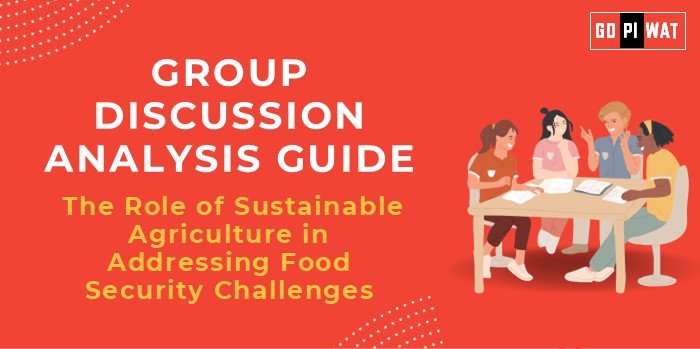🌾 Group Discussion (GD) Analysis Guide
🌍 The Role of Sustainable Agriculture in Addressing Food Security Challenges
🌟 Introduction to the Topic
Opening Context:
Sustainable agriculture is a cornerstone in combating global food security issues, as it aims to increase productivity while preserving environmental resources. With the global population projected to reach 9.7 billion by 2050, sustainable agriculture is critical to ensuring equitable food availability.
Topic Background:
The concept of sustainable agriculture emerged in the late 20th century as a response to the adverse effects of industrial farming, such as soil degradation and loss of biodiversity. Modern methods integrate technology and traditional practices to enhance yield, ensure environmental sustainability, and promote economic stability for farmers.
📊 Quick Facts and Key Statistics
- 🌱 Global Food Demand: By 2050, global food production must increase by 70% to feed the growing population.
- 💨 Agricultural Emissions: Agriculture contributes 19-29% of global greenhouse gas emissions.
- 🌍 Soil Degradation: 33% of the Earth’s soils are moderately to highly degraded due to erosion, nutrient depletion, and over-farming.
- 💧 Irrigation Inefficiency: Agriculture accounts for 70% of global freshwater use, with significant losses due to outdated irrigation methods.
👥 Stakeholders and Their Roles
- Governments: Implement sustainable policies, subsidies, and research funding.
- Farmers: Adopt sustainable practices like crop rotation, organic farming, and precision agriculture.
- NGOs: Promote awareness, provide training, and advocate for fair trade.
- Private Sector: Innovate in agri-tech solutions like AI-driven farming and drought-resistant crops.
- International Organizations: FAO and UNDP drive global programs for sustainable agricultural development.
🎯 Achievements and Challenges
Achievements:
- 🌿 Organic Farming Growth: Global organic farmland increased to over 76 million hectares in 2022.
- 🤖 Agri-Tech Advancements: Precision farming technologies improve water and fertilizer use efficiency by 20-30%.
- 📜 Policy Milestones: The EU’s Green Deal supports climate-resilient agricultural practices.
Challenges:
- 💰 High Costs: Limited access to sustainable technologies for small-scale farmers.
- ☁️ Climate Change: Unpredictable weather patterns disrupt farming cycles.
- 🌎 Global Inequality: Disparity in resource access between developed and developing countries.
🌏 Global Comparisons:
- Success: The Netherlands pioneered high-yield, resource-efficient agriculture.
- Struggle: Sub-Saharan Africa faces persistent food insecurity due to lack of infrastructure.
📚 Case Study:
In India, Andhra Pradesh’s Community Managed Natural Farming (CMNF) program has shown a 30% reduction in costs and increased resilience to climate variations.
🗣️ Structured Arguments for Discussion
- Supporting Stance: Sustainable agriculture reduces environmental impact and improves long-term food security.
- Opposing Stance: High initial costs and lack of awareness hinder widespread adoption.
- Balanced Perspective: While promising, sustainable agriculture requires extensive support systems to overcome economic and logistical barriers.
🛠️ Effective Discussion Approaches
- Opening Approaches:
- “One-third of all food produced globally is wasted, yet over 800 million people face hunger.”
- “Andhra Pradesh has demonstrated that natural farming can boost resilience and reduce costs.”
- Counter-Argument Handling:
- Acknowledge costs but highlight savings over time.
- Compare traditional vs. sustainable agriculture yields with supportive data.
📈 Strategic Analysis of Strengths and Weaknesses
- Strengths: Improves resource efficiency, mitigates climate risks.
- Weaknesses: High costs, steep learning curve for farmers.
- Opportunities: Agri-tech innovations, international collaborations.
- Threats: Climate volatility, global inequalities in resources.
🔗 Connecting with B-School Applications
- Real-World Applications: Explore sustainable supply chains and resource optimization in agribusiness projects.
- Sample Interview Questions:
- “What role does technology play in sustainable agriculture?”
- “How can India balance food security with sustainable farming?”
- Insights:
- Link food security to CSR initiatives.
- Analyze agribusiness models for operational efficiency.


